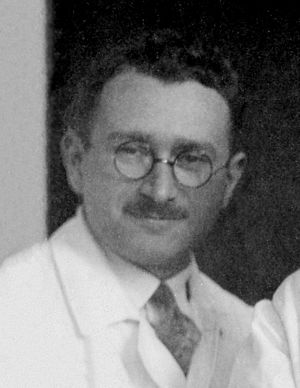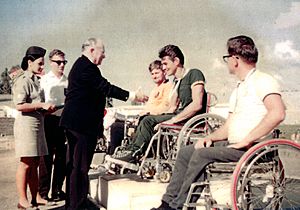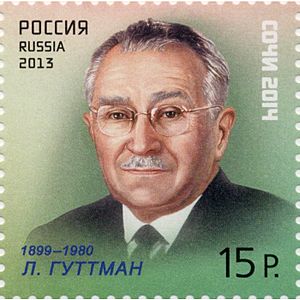Ludwig Guttmann facts for kids
Quick facts for kids
Ludwig Guttmann
|
|
|---|---|
 |
|
| Born | 3 July 1899 |
| Died | 18 March 1980 (aged 80) Aylesbury, Buckinghamshire, United Kingdom
|
| Citizenship | Germany, United Kingdom |
| Known for | Founding the Paralympic Games |
| Medical career | |
| Profession | Neurologist |
| Awards | Fellow of the Royal Society |
Sir Ludwig Guttmann (3 July 1899 – 18 March 1980) was a doctor from Germany and Britain. He was a specialist in the brain and nerves. He started the Stoke Mandeville Games, a sports event for people with disabilities. These games later grew into the Paralympic Games.
Guttmann was a Jewish doctor who had to leave Nazi Germany just before World War II. He is known as a key person in creating organized sports for people with disabilities.
Contents
Early Life and Medical Training
Ludwig Guttmann was born on 3 July 1899. He was from a Jewish family in Tost, a town in what was then Germany (now Toszek, Poland). When he was three, his family moved to Königshütte (now Chorzów, Poland).
In 1917, Guttmann was helping at a hospital. There, he met his first patient with a serious spinal injury. This patient, a coal miner, sadly died later from an infection. That same year, Guttmann finished high school. He then joined the military.
Guttmann started studying medicine in April 1918 at the University of Wrocław. He later moved to the University of Freiburg in 1919. He received his medical degree in 1924.
Escape from Germany
By 1933, Guttmann was working in Breslau (now Wrocław, Poland). He was a brain surgeon and taught at the university. He learned a lot from a leading brain surgeon, Otfrid Foerster.
However, Guttmann lost his job at the university in 1933. This happened because of new laws against Jewish people. His job title was even changed to "one who treats the sick." With the Nazis in power, Jewish doctors were not allowed to practice medicine freely. Guttmann was assigned to work at the Breslau Jewish Hospital. He became its medical director in 1937.
After the violent attacks on Jewish people during Kristallnacht in November 1938, Guttmann told his staff to admit any patients without asking questions. The next day, he explained his actions to the police. Out of 64 patients admitted, 60 were saved from being arrested and sent to Nazi concentration camps.
In early 1939, Guttmann and his family left Germany. This was because of the Nazi persecution of Jewish people. He got a chance to escape when the Nazis gave him a visa. They ordered him to travel to Portugal to treat a friend of the Portuguese leader. Guttmann was supposed to return to Germany through London. But an organization called the Council for Assisting Refugee Academics (CARA) helped him stay in the United Kingdom.
He arrived in Oxford, England, on 14 March 1939. He came with his wife, Else, and their two children, Dennis and Eva. CARA helped them with the British government. They also gave Guttmann's family some money to help them settle in Oxford.
Guttmann continued his research on spinal injuries in Oxford. For the first few weeks, his family stayed at Balliol College. Then they moved into a small house. Both children were offered free places at a local school. The family was part of the growing Jewish community in Oxford.
Stoke Mandeville and the Paralympic Games
In September 1943, the British government asked Guttmann to create a special center. This center was for spinal injuries at Stoke Mandeville Hospital in Buckinghamshire. The idea came from the Royal Air Force. They wanted to make sure pilots with spine injuries got good treatment.
The center opened on 1 February 1944. It was the first special unit for spinal injuries in the UK. Guttmann was its director until 1966. He believed that sports were a very important way to help injured military people get better. Sports helped them build strength and self-respect.
Guttmann became a British citizen in 1945. He organized the first Stoke Mandeville Games for disabled war veterans. These games were held at the hospital on 29 July 1948. This was the same day the 1948 Summer Olympics opened in London. All the participants had spinal cord injuries and competed in wheelchairs. Guttmann used the term Paraplegic Games to encourage his patients. These games later became known as the "Paralympic Games". They grew to include people with other disabilities too.

By 1952, more than 130 athletes from different countries had joined the Stoke Mandeville Games. As the event grew, it impressed the organizers of the Olympic Games. In 1956, Guttmann received the Sir Thomas Fearnley Cup. The International Olympic Committee gave him this award. It was for his great work in helping the Olympic movement through wheelchair sports.
His dream of an international games, like the Olympics, came true in 1960. The International Stoke Mandeville Games were held alongside the 1960 Summer Olympics in Rome. These games are now known as the first Paralympic Games. (The name "Paralympic Games" was officially used later in 1984).
In 1961, Guttmann started the British Sports Association for the Disabled. This group later became the English Federation of Disability Sport.
Later Life and Legacy
Guttmann received several honors for his work. He was made an Officer of the Order of the British Empire (OBE) in 1950. He was promoted to Commander of the Order of the British Empire (CBE) in 1960. He was also knighted by Queen Elizabeth II in 1966, which means he became "Sir Ludwig Guttmann."
In 1961, Guttmann founded the International Medical Society of Paraplegia. This is now called the International Spinal Cord Society (ISCoS). He was the first president of this society. He also became the first editor of a medical journal called Paraplegia (now Spinal Cord). He stopped working as a doctor in 1966 but continued to be involved with sports.
Guttmann had a heart attack in October 1979. He passed away on 18 March 1980, at the age of 80.
Legacy
The Stoke Mandeville Stadium is the National Centre for Disability Sport in the UK. Guttmann helped develop it next to the hospital.
A special hospital in Barcelona, Spain, is named in his honor. It is called the Institut Guttmann. It helps people with nerve injuries.
In June 2012, a statue of Guttmann was revealed at Stoke Mandeville Stadium. This was before the London 2012 Summer Paralympics. After the games, the statue was moved to its permanent home at the National Spinal Injuries Centre. Guttmann's daughter, Eva Loeffler, was chosen as the mayor of the Paralympic Games athletes' village in London 2012.
In August 2012, the BBC showed a TV film called The Best of Men. It was about Guttmann's work at Stoke Mandeville during and after World War II. The film showed how he gave purpose to seriously injured patients.
The Sir Ludwig Guttmann Centre is a health facility in London. It provides medical services on the site of the 2012 Olympic village.
The Sir Ludwig Guttmann Lectureship was created by the International Medical Society of Paraplegia. It honors Guttmann's important work and his contributions to spinal cord care.
The Ludwig Guttmann Prize is given for excellent scientific work in spinal cord injury research.
On 24 October 2013, a special plaque was put up at the National Spinal Injuries Centre. It celebrates Guttmann's life and work.
In 2019, the National Paralympic Heritage Centre opened at Stoke Mandeville Stadium. It is a museum that celebrates the start of the Paralympics. It shares stories and items from the early Paralympic Movement. It also highlights the important role Sir Ludwig Guttmann played.
On 3 July 2021, a Google Doodle of Guttmann was shown on the Google homepage. This was for his 122nd birthday.
Selected Publications
- 1959. The Place of Our Spinal Paraplegic Fellow-Man in Society: A Survey on 2000 Patients.
- 1973. Spinal Cord Injuries: Comprehensive Management and Research.
- 1973. "Sport and Recreation for the Mentally and Physically Handicapped" in The Journal of the Royal Society for the Promotion of Health.
- 1976. Textbook of Sport for the Disabled.
See also
 In Spanish: Ludwig Guttmann para niños
In Spanish: Ludwig Guttmann para niños
 | Audre Lorde |
 | John Berry Meachum |
 | Ferdinand Lee Barnett |


